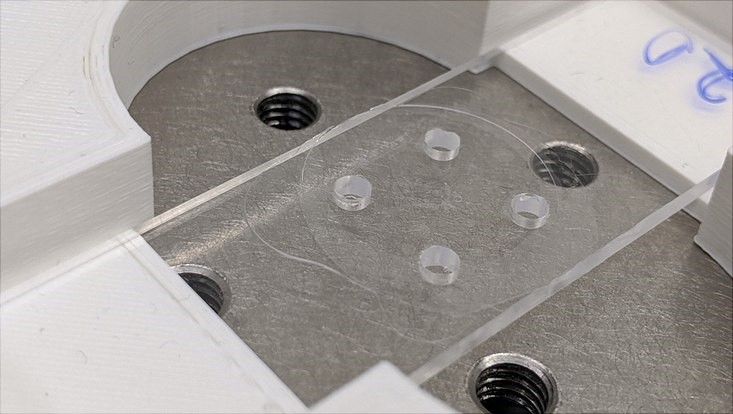DESY and the University of Hamburg work on new corona rapid test
The new technology combines the advantages of PCR and antigen tests. DESY is using know-how from particle physics.
The corona pandemic is far from over and the need for fast, efficient testing for the SARS-CoV-2 virus remains in high demand. An interdisciplinary research team from the University of Hamburg and DESY works now on developing a newly designed test for detecting SARS-CoV-2. The versatility of the test design has the potential for different applications. Researchers are already veying the possibility of a spin-off at a later stage. The DESY Start-up Office as well as the Transfer Office of the University of Hamburg are already in close contact with the founders-to-be.
The team focuses on a new method for designing the test: ultra-sensitive screenings based on combined virion counting, i.e. virus particles outside the cell, and DNA analysis. This approach gives the test the precision of a PCR test and the speed of an antigen test. "We want to develop a highly sensitive test to detect the corona virus and other types of viruses that works much faster and for which no laboratory is needed," says Dr Irene Fernandez-Cuesta from the Department of Physics at the University of Hamburg. The aim is to develop a small test equipment, approcimately the size of a microwave oven, which can easily delpoyed anywhere and deliver results within minutes, thus enabling on-site testing, for example in nursing homes or airports for large numbers of people.
Dr Arik Willner, Chief Technology Officer DESY, says: "This cooperation between the University of Hamburg and DESY not only addresses a current need, but also shows that transfer is actively promoted at DESY from the very beginning of different projects. In this case DESY is supporting the project financially with funds from a funding pot for corona-related research. At the same time, this shows how important DESY's knowledge and expertise in the field of detector development are for such relevant applications."
An interdisciplinary team is developing the test. In four project phases the test setup is to be brought to market maturity. In phase 1, which has just started, the aim is to demonstrate the functionality of the tests and develop the portable test setup. For this purpose, the DESY and the University of Hamburg are providing funds.
The team at DESY led by Prof. Dr Ingrid-Maria Gregor and Dr Sergio Diez will design and build the test station for the portable and highly sensitive in-situ analysis. The experience of the DESY team in the development of high-precision detectors for particle physics is of central importance here, because the interaction of the nanochannels and the detector in the rapid test represents a major precision-mechanical challenge. In addition, the physicists contribute with their experience in the field of pattern recognition to accelerate the readout of the test result.
Once the technology has been developed abnd applied to detect the corona virus, the technological basis can also be applied to other pathogens. DESY thus not only contributes to the fight against the current pandemic, but also supports the prevention of possible further pandemics and the diagnosis of viral diseases.
published
- 2020/11/23
Press Contact
- innovation@desy.de


